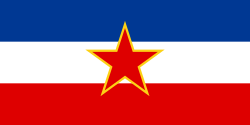Jörg Rosskopf

| Jörg Rosskopf | ||
| Bordtennis, herrar | ||
| Nation: | ||
|---|---|---|
| Silver | Barcelona 1992 | Herrdubbel |
| Brons | Atlanta 1996 | Herrsingel |
| Världsmästerskap | ||
| Guld | Dortmund 1989 | Herrdubbel |
| Silver | Doha 2004 | Herrlag |
| Brons | Bremen 2006 | Herrlag |
| Brons | Göteborg 1993 | Herrlag |
| Europamästerskap | ||
| Guld | Stuttgart 1992 | Singel |
| Brons | Paris 1988 | Singel |
| Brons | Göteborg 1990 | Singel |
| Brons | Courmayeur 2003 | Singel |
| Guld | Eindhoven 1998 | Dubbel |
| Silver | Göteborg 1990 | Dubbel |
| Brons | Birmingham 1994 | Dubbel |
| Brons | Bratislava 1996 | Dubbel |
| Guld | Belgrad 2007 | Lag |
| Silver | Göteborg 1990 | Lag |
| Silver | Bremen 2000 | Lag |
| Silver | Courmayeur 2003 | Lag |
Jörg Rosskopf, född 22 maj 1969 i Dieburg i Tyskland, är en tysk bordtennisspelare.
Under sin karriär vann han 4 medaljer i bordtennis-VM varav 1 guld, 1 silver och 2 brons.
Han deltog även i nio bordtennis-EM, där han tog 12 medaljer - 3 guld, 4 silver och 5 brons.
Han är en av sju bordtennisspelare som deltagit i de fem första Olympiska spelen sedan sporten kom med på det olympiska programmet 1988. De andra är svenskarna Jörgen Persson och Jan-Ove Waldner, kroaten Zoran Primorac, belgaren Jean-Michel Saive, ungraren Csilla Bátorfi, och serb-amerikanen Ilija Lupulesku.
Meriter
- Bordtennis VM
- 1985 i Göteborg
- 17:e plats med det tyska laget
- 1987 i New Delhi
- 7:e plats med det tyska laget
- 1989 i Dortmund
- 1:a plats dubbel (med Steffen Fetzner)
- 7:e plats med det tyska laget
- 1991 i Chiba
- Kvartsfinal dubbel
- kvartsfinal mixed dubbel
- 5:e plats med det tyska laget
- 1993 i Göteborg
- 3:e plats med det tyska laget
- 1995 i Tianjin
- 5:e plats med det tyska laget
- 1997 i Manchester
- Kvartsfinal dubbel
- 4:e plats med det tyska laget
- 2000 i Kuala Lumpur
- 5-8:e plats med det tyska laget
- 2001 i Chiba
- 7:e plats med det tyska laget
- 2004 i Doha
- 2:a plats med det tyska laget
- 2006 i Bremen
- 3:e plats med det tyska laget
- 2008 i Guangzhou
- 7:e plats med det tyska laget
- 1985 i Göteborg
- Bordtennis EM
- 1988 i Prag
- 3:e plats singel
- kvartsfinal dubbel
- 1990 i Göteborg
- 3:e plats singel
- 2:a plats dubbel (med Steffen Fetzner)
- 2:a plats med det tyska laget
- 1992 i Stuttgart
- 1:a plats singel
- Kvartsfinal dubbel
- Kvartsfinal mixed dubbel
- 1994 i Birmingham
- Kvartsfinal singel
- 3:e plats dubbel (med Steffen Fetzner)
- 1996 i Bratislava
- Kvartsfinal singel
- 3:e plats dubbel (med Steffen Fetzner)
- 1998 i Eindhoven
- 1:a plats dubbel (med Vladimir Samsonov)
- 2000 i Bremen
- Kvartsfinal dubbel
- 2:a plats med det tyska laget
- 2003 i Courmayeur
- 3:e plats singel
- 2:a plats med det tyska laget
- 2007 i Belgrad
- 1:a plats med det tyska laget
- 1988 i Prag
- OS
- 1992 i Barcelona
- Kvartsfinal singel
- 2:a plats dubbel (med Steffen Fetzner)
- 1996 i Atlanta
- 3:e plats singel
- 4:e plats dubbel (med Steffen Fetzner)
- 2000 i Sydney
- Kvartsfinal singel
- 1992 i Barcelona
- Europa Top 12
- 1988 i Ljubljana : 6:e plats
- 1989 i Charleroi : 7:e plats
- 1990 i Hannover : 5:e plats
- 1991 i Hertogenbosch: 5:e plats
- 1992 i Wien: 2:a plats
- 1993 i Köpenhamn: 3:e plats
- 1994 i Arezzo: 5:e plats
- 1995 i Dijon: 5:e plats
- 1996 i Charleroi: 5:e plats
- 1997 i Eindhoven: 7:e plats
- 1998 i Halmstad: 5:e plats
- 1999 i Split: 5:e plats
- 2000 i Alassio: 3:e plats
- 2001 i Wels: 5:e plats
- 2003 i Saarbrücken: 9:e plats
- 2004 i Frankfurt: 5:e plats
Källor
- Den här artikeln är helt eller delvis baserad på material från tyskspråkiga Wikipedia, tidigare version.
Externa länkar
- ITTF.com
- JorgRosskopfs webbsida
 Wikimedia Commons har media som rör Jörg Rosskopf.
Wikimedia Commons har media som rör Jörg Rosskopf.
Media som används på denna webbplats
De olympiska ringarna, med genomskinlig bakgrund.
Flag of England. Saint George's cross (a red cross on a white background), used as the Flag of England, the Italian city of Genoa and various other places.
Flag of the Socialist Federal Republic of Yugoslavia (1946-1992).
The design (blazon) is defined in Article 4 of the Constitution for the Republic of Yugoslavia (1946). [1]
Flag of the Socialist Federal Republic of Yugoslavia (1946-1992).
The design (blazon) is defined in Article 4 of the Constitution for the Republic of Yugoslavia (1946). [1]
Chinese Taipei Olympic Flag. According to the official website of Chinese Taipei Olympic Committee, Blue Sky(circle) & White Sun(triangles) above the Olympic rings is neither the National Emblem of the Republic of China, nor the Party Emblem of Kuomintang (KMT), but a design in between, where the triangles do not extend to the edge of the blue circle, as registered at International Olympic Committee in 1981 and digitally rendered in 2013. Besides, the blue outline of the five-petaled plum blossom is broader than the red one. Moreover, the CMYK code of the blue one and the Blue Sky & White Sun is "C100-M100-Y0-K0", and different from the Olympic rings (C100-M25-Y0-K0). Note that it's the only version recognized by IOC.
Författare/Upphovsman: Ralf Roletschek (talk) - Infos über Fahrräder auf fahrradmonteur.de, Licens: CC BY-SA 3.0
 |
am 28. Juni 2012 in Mainz - Olympische Sommerspiele 2012 |
 |












